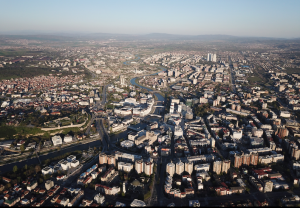
On 4 October 2023, North Macedonia became the 28th country to join the UNECE-WHO/Europe Protocol on Water and Health, thus committing to drive action on water, sanitation and hygiene, protecting its natural resources and fostering a healthier environment for its citizens.
The Protocol on Water and Health is a unique, legally binding intergovernmental framework protecting human health and well-being by ensuring access to clean, safe water and adequate sanitation. By joining the Protocol, North Macedonia – which has a population of 2.1 million people – becomes part of an active community dedicated to advancing sustainable water management practices and improving public health.
North Macedonia’s accession will consolidate strong engagement with the Protocol and the use of its tools. In 2015-2016, it underwent a self-assessment on the equity of access to water and sanitation by applying the Equitable Access Score-card in cooperation with a non-governmental organization. In line with the Protocol requirements regarding the involvement of the public, civil society participation was ensured throughout the process. The self-assessment found that 83% of the population in rural areas had access to improved sanitation compared to 99% in urban areas. It also showed the need to address the water and sanitation needs of vulnerable and marginalized communities, such as persons with special physical needs and people without housing. Following the assessment, North Macedonia developed an action plan to address the identified limitations in ensuring access to safe drinking water and sanitation. Additionally, the country developed a self-assessment checklist on water, sanitation, and hygiene (WASH) and infection control in schools and established an online dashboard.
Due to North Macedonia's experience in the work of equitable access to water and sanitation, the country expressed its willingness to join France and Hungary as a co-lead for this area of work under the Protocol at the sixth session of the Meeting of the Parties to the Protocol on Water and Health (Geneva, 16-18 November 2022). North Macedonia is, therefore, bringing its political leadership and a wealth of knowledge and experience to the Protocol community.
UNECE Executive Secretary Tatiana Molcean stated “I welcome North Macedonia’s commitment to addressing gaps in access to water, sanitation and hygiene. UNECE stands ready to help the country leverage tools and expertise under the Protocol on Water and Health, which will be further enriched by the country’s experience”.
The Minister of Environment and Physical Planning of North Macedonia, Kaja Shukova, highlighted the implementation of the national legal framework for the protection of human health and well-being through the improvement of water management, including the protection of aquatic ecosystems, as well as through the prevention, control and reduction of water related diseases, as “a sure guarantee and commitment of the Government of the Republic of North Macedonia in implementing the Protocol on Water and Health”. Demonstrating the country’s engagement for access to sanitation and hygiene, she further highlighted the adoption of a Law decreasing the VAT for all menstrual pads from 18 to 5%.
By becoming a Party to the Protocol, North Macedonia can further benefit from its legal framework, guidance and tools by setting its integrated targets on water, sanitation, hygiene and health and regularly reporting in progress, in line with Sustainable Development Goals (SDGs) 6, 3 and others. With a specific focus on water and sanitation-related climate change impacts, the Protocol supports countries in building resilience to climate-induced extreme weather events in the water and sanitation sector.
The Protocol on Water and Health, adopted in 1999, is a multilateral environmental agreement under the auspices of the United Nations Economic Commission for Europe (UNECE) and the World Health Organization Regional Office for Europe (WHO/Europe). It seeks to safeguard human health by ensuring access to clean and safe water, sanitation and hygiene. The Protocol serves as an important instrument for countries of the pan-European region working collectively to address water challenges, promote the SDGs, and implement the EU Directives on water and sanitation.